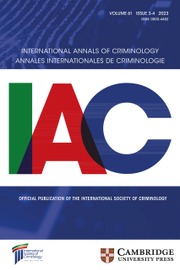Article contents
The Controversial Involvement of Non-State Actors in the Commission of Enforced Disappearances: An Introduction
Published online by Cambridge University Press: 27 March 2023
Abstract
Enforced disappearance is one of the most horrific crimes of our time. This is a crime that causes excruciating suffering to its victims: the disappeared and their families and relatives. Thousands of people have suffered, and are still suffering, all over the world from enforced disappearances. To combat this scourge, a United Nations Convention was adopted in 2006 and entered into force in 2010. It adopted a definition of enforced disappearance that includes an important element: the direct or indirect involvement of the State Party in the commission of the enforced disappearance. Yet, private entities (commonly referred to as non-State actors) can also commit acts similar to enforced disappearances. However, in the absence of the element of the State Party’s involvement, can we go so far as to qualify the acts perpetrated by non-State actors as enforced disappearances? This question has generated and continues to generate an interesting debate.
Abstracto
La desaparición forzada es uno de los crímenes más horribles de nuestro tiempo. Un crimen que causa un sufrimiento atroz a sus víctimas: los desaparecidos y sus familiares y allegados. Miles de personas han sufrido y siguen sufriendo, en todo el mundo, por las desapariciones forzadas. Para combatir este flagelo se adoptó una Convención de las Naciones Unidas en 2006 y entró en vigor en 2010. Adoptó una definición de desaparición forzada que incluye un elemento importante: la participación directa o indirecta del Estado Parte en la comisión de la desaparición forzada. Sin embargo, las entidades privadas (comúnmente conocidas como actores no estatales) también pueden cometer actos similares a las desapariciones forzadas. Pero, en ausencia del elemento de participación del Estado Parte, ¿podemos llegar a calificar los actos perpetrados por actores no estatales como desapariciones forzadas? Esta pregunta ha generado y sigue generando un interesante debate.
Abstrait
La disparition forcée est un des crimes les plus horribles de notre temps. Un crime qui cause des souffrances atroces à ses victimes : les disparus et leurs familles et proches. Des milliers de personnes en ont souffert et en souffrent encore partout dans le monde. Pour combattre ce fléau une convention onusienne a été adoptée en 2006 et entrée en vigueur en 2010. Elle a adopté une définition de la disparition forcée qui inclue un élément important à savoir : l’implication directe ou indirecte de l’Etat partie dans la commission de la disparition forcée. Ceci dit, les entités privées (communément qualifiées d’acteurs non étatiques) peuvent être aussi commettre des actes qui s’apparentent à des disparitions forcées. Mais en l’absence de l’élément de l’implication de l’Etat partie peut-on aller jusqu’à qualifier les actes des acteurs non étatiques de disparitions forcées ? Cette question suscite et continue à susciter un débat intéressant.
抽象的
强迫失踪是我们这个时代最可怕的罪行之一。 一种对其直接和间接受害者造成极度痛苦的罪行:失踪者及其家人和亲属。 世界各地有成千上万的人已经并且仍在遭受强迫失踪之苦。 为打击这一祸害,2006 年通过了一项联合国公约,并于 2010 年生效。它通过了强迫失踪的定义,其中包括一个重要因素:缔约国直接或间接参与强迫失踪的实施。 然而,私人实体(通常称为非国家行为者)也可以实施类似于强迫失踪的行为。 但是,在没有缔约国参与的情况下,我们是否可以将非国家行为者实施的行为定性为强迫失踪? 这个问题已经产生并将继续产生有趣的争论。
الملخص
يعتبر الاختفاء القسري من أفظع الجرائم في عصرنا. جريمة تسبب معاناة رهيبة لضحاياها: المختفين وذويهم وأقاربهم. لقد عانى آلاف الأشخاص وما زالوا يعانون في جميع أنحاء العالم من الاختفاء القسري. لمكافحة هذه الآفة ، تم اعتماد اتفاقية للأمم المتحدة في عام 2006 ودخلت حيز التنفيذ في عام 2010. واعتمدت تعريفاً للاختفاء القسري يتضمن عنصراً هاماً: المشاركة المباشرة أو غير المباشرة للدولة الطرف في ارتكاب الاختفاء القسري. ومع ذلك ، يمكن للكيانات الخاصة (التي يشار إليها عادة باسم الجهات الفاعلة من غير الدول) أن ترتكب أعمالًا مشابهة لحالات الاختفاء القسري. ولكن ، في ظل غياب عنصر مشاركة الدولة الطرف ، هل يمكننا أن نذهب إلى حد وصف الأفعال التي ترتكبها جهات فاعلة من غير الدول بأنها عمليات اختفاء قسري؟ لقد أثار هذا السؤال ولا زال يثير نقاشا مهما.
Keywords
- Type
- Article
- Information
- Copyright
- © International Society of Criminology, 2023
Footnotes
This article is a summary an oral intervention presented during the forum on Criminal Justice and Human rights organized at the Faculty of Law, Mohamed V University Rabat Morocco on the 12th and the 13th May 2022.
References
1 General Assembly of the United Nations, Resolution 47/133, International Convention for the Protection of All Persons from Enforced Disappearance, New York, 20 December 2006, entered into force 23 December 2010. Retrieved 25 January 2023 (https://www.ohchr.org/en/instruments-mechanisms/instruments/international-convention-protection-all-persons-enforced).
2 Rome Statute of the International Criminal Court, Rome, 17 July 1998, entered into force 1 July 2002. Retrieved 25 January 2023 (https://www.icc-cpi.int/sites/default/files/RS-Eng.pdf).
- 1
- Cited by




